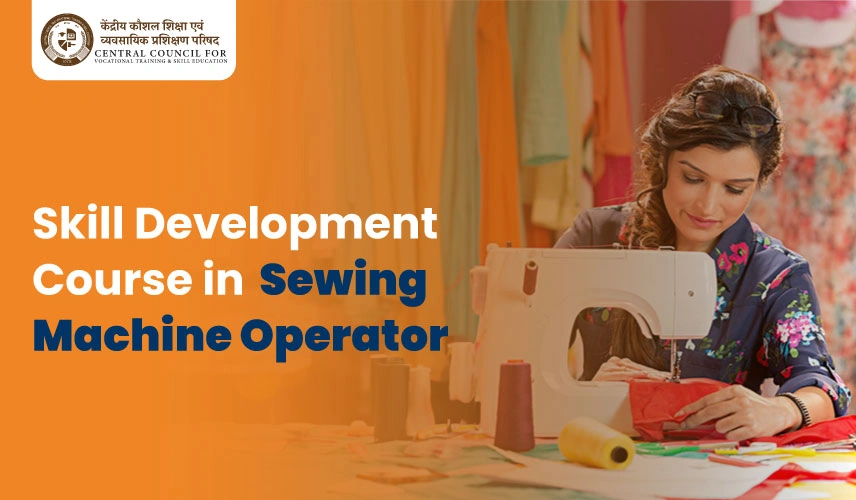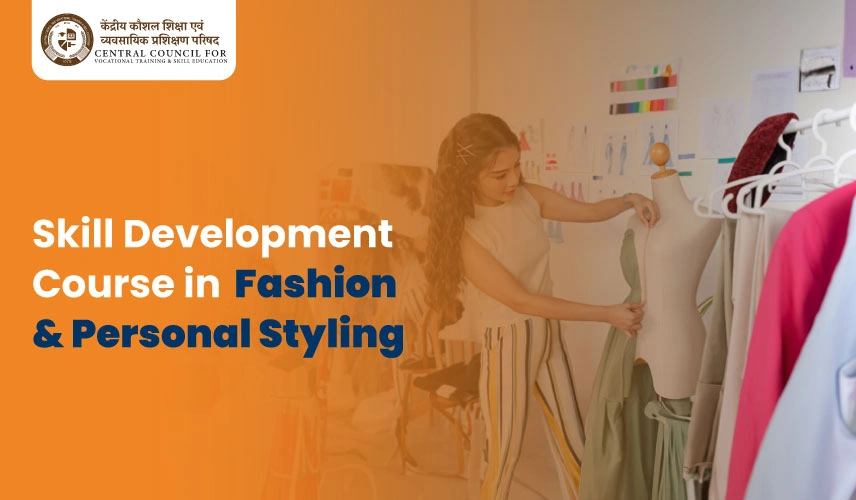- +91 8595350621
- info@ccvte.org
- C4/97B, Keshav Puram, Delhi-110035
Sewing Machine Operator

Skill Development Program in Sewing Machine Operator
A Sewing Machine Operator is a skilled professional essential in the textile and garment manufacturing industries, responsible for operating various sewing machines to create, alter, and repair fabric-based products. Their key responsibilities include setting up and adjusting machines, measuring and cutting fabric, sewing and assembling garments, and performing quality control to ensure products meet specifications. Operators must possess technical skills in machine operation, knowledge of different sewing techniques, attention to detail, manual dexterity, physical stamina, and problem-solving abilities. They typically work in factories, tailor shops, or costume and upholstery workshops, often starting as trainees before advancing to experienced operators, supervisors, or trainers, with opportunities to specialize in niche areas like embroidery or leatherwork. The role demands precision and efficiency, and while entry-level salaries may be modest, there is potential for wage growth with experience. Despite some regional competition due to automation and outsourcing, the job outlook remains steady, offering a fulfilling career for those passionate about textiles and precision work.
Why did you choose the Sewing Machine Operator Course from CCVTE?
Choosing a Sewing Machine Operator course from a CCVTE offers several advantages:
- Industry-Relevant Curriculum: We provide up-to-date and practical knowledge that aligns with current industry standards and demands.
- Expert Instructors: Our courses are typically taught by experienced professionals and researchers who are leaders in the field, ensuring high-quality instruction.
- Hands-On Experience: Our courses offer hands-on projects and real-world case studies, allowing you to apply theoretical knowledge and build a robust portfolio.
- Networking Opportunities: Enrolling in Our courses we can provide networking opportunities with peers, instructors, and industry professionals, which can be valuable for career growth.
- Certification: Upon completion, you often receive a recognized certification or diploma that can enhance your resume and improve job prospects.
- Access to Resources: Our courses usually provide access to a wealth of learning materials, tools, and platforms that can facilitate deeper understanding and practical skills development.
- Career Support: We provide career support services such as job placement assistance, resume reviews, and interview preparation, helping you transition into the workforce more smoothly.
Specialization in Sewing Machine Operator
- Fabric and Material Knowledge
- Speed and Efficiency
- Problem-Solving Skills
- Quality Control
- Safety and Maintenance
- Specialized Techniques
- Teamwork and Communication
Career opportunities
- Sewing Machine Operator
- Quality Control Inspector
- Pattern Maker
- Tailor/Dressmaker
- Production Supervisor
- Alteration Specialist
- Industrial Sewing Technician
- Sample Maker
- Textile Worker
- Freelance Sewing Professional
- Entrepreneur
|
3 Months |
6 Months |
1 year |
2 years |
|
Introduction to Sewing Machine Operations |
Introduction to Sewing Machine Operations |
Introduction to Sewing Machine Operations |
Introduction to Sewing Machine Operations |
|
Basic Sewing Techniques |
Basic Sewing Techniques |
Basic Sewing Techniques |
Basic Sewing Techniques |
|
Fabric Types and Handling |
Fabric Types and Handling |
Fabric Types and Handling |
Fabric Types and Handling |
|
Stitching Methods and Patterns |
Stitching Methods and Patterns |
Stitching Methods and Patterns |
Stitching Methods and Patterns |
|
Sewing Machine Maintenance and Troubleshooting |
Sewing Machine Maintenance and Troubleshooting |
Sewing Machine Maintenance and Troubleshooting |
|
|
Garment Construction Basics |
Garment Construction Basics |
Garment Construction Basics |
|
|
Advanced Sewing Techniques |
Advanced Sewing Techniques |
Advanced Sewing Techniques |
|
|
Quality Control in Sewing |
Quality Control in Sewing |
Quality Control in Sewing |
|
|
Industrial Sewing Machines and Their Uses |
Industrial Sewing Machines and Their Uses |
||
|
Sewing for Different Garment Types |
Sewing for Different Garment Types |
||
|
Time Management and Efficiency in Sewing |
Time Management and Efficiency in Sewing |
||
|
Safety Practices in Sewing Operations |
Safety Practices in Sewing Operations |
||
|
Introduction to Embroidery and Decorative Stitches |
|||
|
Costing and Inventory Management |
|||
|
Production Planning and Workflow |
|||
|
Final Project and Assessment |
Top hiring Companies
- Apparel Manufacturers
- Textile Mills
- Furniture Manufacturers
- Automotive Interior Manufacturers
- Footwear Companies
- Upholstery Shops
- Sporting Goods Manufacturers
- Home Goods Manufacturers
- Arvind Limited
- Raymond Ltd.
- Lakshmi Machine Works Ltd.
- Mandhana Industries Ltd.
- Bombay Dyeing & Manufacturing Company Ltd.
- Siyaram Silk Mills Ltd.
- Vardhman Textiles Ltd.
- Indo Count Industries Ltd.
Other Apparel Courses Provided by CCVTE
Frequently Asked Questions
This course trains individuals to operate sewing machines for various purposes in the textile and garment industry.
Yes, the course includes hands-on training to ensure students gain practical experience in operating sewing machines.
It Depends on your Course Duration if you complete a 3 and 6 months course , so you will get a certificate . and if you complete a 1 and 2 years course so you will get a diploma and advanced diploma.
Choosing a Sewing Machine Operator Course from a CCVTE offers several advantages:
Industry-Relevant Curriculum, Expert Instructors, Hands-On Experience, Networking Opportunities, Certification, Access to Resources , and Career Support.
Sewing Machine Operator ,Quality Control Inspector ,Pattern Maker , Tailor/Dressmaker ,Production Supervisor , Alteration Specialist , Industrial Sewing Technician ,Sample Maker.




